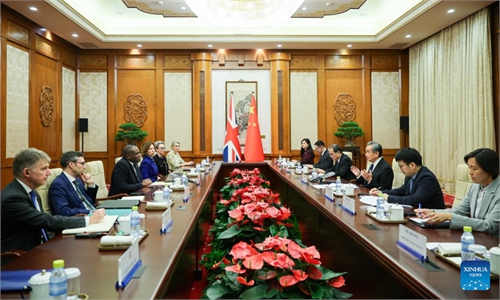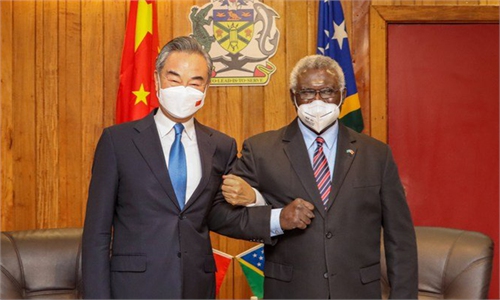
Illustration: Xia Qing/GT
Last week, British Prime Minister Keir Starmer vowed to increase the UK's military deployment in the Pacific Ocean in the form of "joint fishing patrols" in order to improve "regional stability," arguing that the region, situated on the other side of the planet from London, was "important" to the country's "security." The pledge came as the prime minister effectively received the cold shoulder at the Commonwealth Heads of Government Meeting where controversy over reparations for British slavery dominated the headlines. Although the new government has significantly moderated its position on China and sought to open re-engagement with Beijing, the media nonetheless framed the deployment as an "anti-China move" aimed at "countering Beijing's influence in the Pacific."
First, one should not be naïve regarding the British government's foreign policy. While it is undeniably a huge improvement over the preceding administrations, which represents a low bar given their mismanagement of UK foreign affairs in modern political times, the fundamental center ground has not changed, nor should we have expected it to.
The Keir Starmer government has continued to emphasize the "special relationship" with the US and therefore strives to follow the strategic consensus Washington has set with its allies: to contain the rise of China by emphasizing the "Indo-Pacific," seeking to militarize the region and building partnerships aimed at isolating Beijing.
The new government thus continues to follow this established path, albeit provocatively, and does not, as Boris Johnson and Rishi Sunak did, use anti-Chinese sentiment to cover up their domestic political failures.
This position is similar to that of Anthony Albanese in Australia. However, under the power of the US, they cannot truly change their strategic objectives and instead seek to continue militarizing in a "quieter" way.
This leads to the next point, the United Kingdom, owing to its legacy of empire, has always believed that it has a political "stake" in the South Pacific, even as it has been displaced by the rise of other powers. Britain may be obsolete as a player in the region in practice, owing to geographical factors. For the US, its ultimate goal is to maintain its 20th century dominance over the region and prevent China from gaining sway over the Pacific Island nations, some of which were once under British rule. The Solomon Islands, for example, is an effective member of the Commonwealth and continues to have the British Monarch as its head of state. However, the islands have chosen Beijing as a partner in recent years, which has set off hysteria in Anglophone capitals over their "waning" influence in the Pacific, and their "rightful domain."
Therefore, it must be understood that "joint patrols" related to "illegal fishing" are conduits for anti-China objectives. This has been an issue placed on the agenda and utilized by the US, pushing a narrative that Chinese "illegal fishing" is a huge problem and proposing itself as the solution. By pushing this narrative, the US seeks to weaponize anti-China sentiment in targeted countries, stifle their relationships with Beijing and thus increase military cooperation with their respective navies and coast guards, strengthening the political hands of those countries to oppose China. Thus, it is a proxy means to advancing containment of China, and we can only assume that by latching onto this issue, Britain is aligning itself with the US strategy.
One must question the feasibility of Britain's relevance in the Pacific: Is Britain really significant in the Pacific anymore? The answer is no. Yet, it has been a persistent shortcoming of British foreign policymakers to incorporate the sentiment of empire into their thinking.
The new British government faces a stagnating economy, growing social unrest and is about to distribute a hugely unpopular budget. The UK government would be wise to fix things at home before attempting to fight conflicts on the other side of the world, which are in fact far removed from "British interests." One just needs to consider the frosty reception he received at the Commonwealth Heads of Government Meeting to understand why Britain isn't taken seriously anymore.
The author is a political and historical relations analyst. opinion@globaltimes.com.cn



